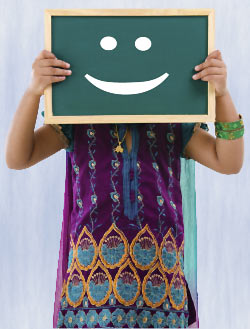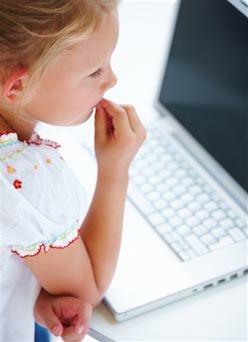Prosopagnosia in Children
What are the symptoms of face blindness in young children?
It can be difficult to spot face blindness in children, and particularly to isolate the difficulty from other behavioural symptoms that may be a result of the condition. We recommend that you download our symptom checklist for further assistance, but some key signs of face blindness in children are:- Your child frequently fails to recognize familiar people when encountering them in unexpected contexts.
- Your child is particularly 'clingy' when in public places where (s)he may lose you.
- Your child waits for you to wave when collecting him/her from school, and has mistakenly approached strangers thinking they are you.
- When asked to imagine a familiar person's face, your child displays an unusual reliance on external cues to recognition (e.g. hairstyle), rather than describing the facial features themselves.
- Your child may be socially withdrawn at school and appear to have a difficulty making friends. This may be in contrast to their more confident behaviour at home when recognition is not an issue.
- Your child has difficulty following the plots of TV shows or films.

Can I get a diagnosis of face blindness for my child?
It is currently very difficult to obtain a formal diagnosis of face blindness from either an educational (e.g. an educational psychologist) or a medical professional in the UK. Indeed, while there are formal systems in place for the diagnosis of other cognitive, perceptual, or socio-emotional disorders, both public and professional awareness of prosopagnosia is low. While the condition is recognised by the NHS (UK), it can be hard to access a professional with suitable expertise.
Some laboratories based at universities now offer screening sessions suitable for children, often linked to a formal research programme. If you would like to have your child tested by our team, please register your details with us here. We are currently running a number of research studies investigating different remediation techniques, and we will also provide you with information about these opportunities when you visit.
What support is currently available for my face blind child?
Because there is little awareness of prosopagnosia, it can be very difficult to gain professional support for your child. You may also be unsure whether you should advise your child's teachers and/or friends about the issue, perhaps because you are worried about how they will react. However, there are clearly safety issues associated with prosopagnosia, not least because a face blind child may be more likely to approach and trust a stranger. Whether or not to 'come out' about prosopagnosia is an issue that perplexes both adults and children with the condition, with many adults worrying about the implications for their career. Children may also worry about how their peers will react, and it is a complex decision with no right or wrong answer.
I am an educational professional who suspects a child may have face blindness - what can I do to support this child?
If you suspect a child may have face blindness, some insight can initially be gained by having an informal conversation with the child and his/her family. Do they frequently fail to recognize people? Are there any other explanations for their social behaviour or failures of recognition? It may be that you agree a screening session would be useful. If you would like support with this or to utilise our resources, please register here. If a child is happy to go public about their face blindness, you could discuss strategies with teachers that may help with the child's socialisation at school. For instance, a teacher could switch to using a seating plan for their classes to help the face blind child identify peers, and can encourage other children to initiate conversations with the child and to remember they should identify themselves at the start of an interaction. It may also help for the child to have a 'buddy' in the playground who wears a distinctive marker.
